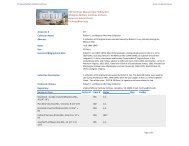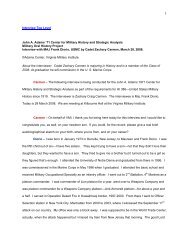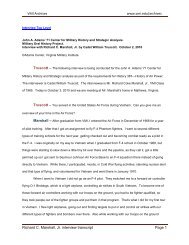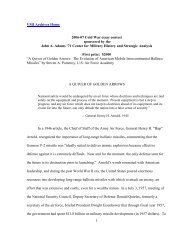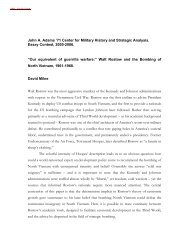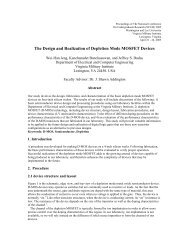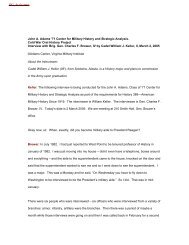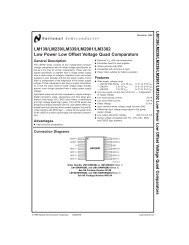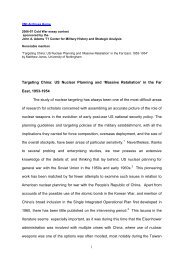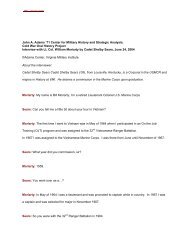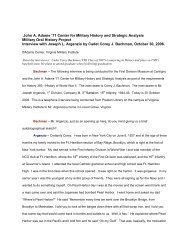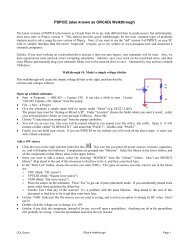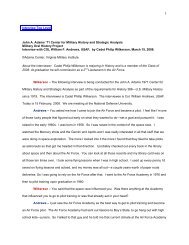Academic Catalog - Virginia Military Institute Admissions
Academic Catalog - Virginia Military Institute Admissions
Academic Catalog - Virginia Military Institute Admissions
Create successful ePaper yourself
Turn your PDF publications into a flip-book with our unique Google optimized e-Paper software.
<strong>Virginia</strong> <strong>Military</strong> <strong>Institute</strong><br />
12-13 <strong>Catalog</strong>ue<br />
of topics such as nervous system development, cerebral lateralization of function, brain<br />
damage and neuroplasticity, and biological mechanisms underlying sensory and motor<br />
function, neuropsychological diseases, learning and memory, and motivation and emotion.<br />
Prerequisite: PS 201 and PS 203.<br />
PS 290 and PS 291. INDEPENDENT RESEARCH 0—4—2<br />
0—6—3<br />
These courses are for third classmen pursuing research during the fall and/or spring<br />
semesters. Permission of instructor and department head required. Prerequisite: PS 201.<br />
PS 292 and PS 293. INDEPENDENT RESEARCH 0—4—2<br />
0—8—4<br />
These courses are for rising second classmen pursuing research during the summer.<br />
Permission of instructor and department head required. Prerequisite: PS 201.<br />
PS 301. PSYCHOLOGY OF LEARNING 3—0—3<br />
The empirical and theoretical examination of learning and memory. Topics covered include<br />
conditioning, discrimination, short-term and long-term retention. Prerequisite: PS 201.<br />
PS 302. SOCIAL PSYCHOLOGY 3—0—3<br />
Behavior and experiences of the individual in society, group dynamics and social institutions,<br />
human relations, morale and leadership. Prerequisite: PS 201.<br />
PS 304. EDUCATIONAL PSYCHOLOGY 3—0—3<br />
Emphasis is upon learning and instruction by cadets and teacher. Educational theories<br />
and their practice are explored through tutoring in the local schools and colleges. Useful<br />
whether or not the cadet plans a teaching career. Prerequisite: PS 201.<br />
PS 305. ABNORMAL PSYCHOLOGY 3—0—3<br />
An introductory course on the scientific study and treatment of deviant human behavior.<br />
This course will briefly trace the history of treatment of psychological disorder from the<br />
middle ages to the present, extensively describe important determinants of personality,<br />
causes of abnormal behavior (psychogenic and organic), describe major personality theories<br />
and methods of therapy. Prerequisite: PS 201.<br />
PS 306. HUMAN RESOURCE MANAGEMENT 3—0—3<br />
A survey of principles and practices used by Human Resource and General Managers<br />
and the managed in their work situations. Most intensive study of the functions of selection<br />
and placement; training and development; compensation and benefits; employee and labor<br />
relations/communications, health, safety, and security. Note: <strong>Academic</strong> credit will not be<br />
given for both BU 322 and PS 306. PS 306 will not fulfill a liberal arts elective for EC-BU<br />
majors. Prerequisite: PS 201.<br />
PS 307. DEVELOPMENTAL PSYCHOLOGY 3—0—3<br />
A survey of human growth and development, this course presents a life-span approach<br />
to the important, modern forces which have the greatest impact on the life changes of the<br />
individual. Opportunities to apply textbook theories and principles will be provided throughout<br />
the semester. Prerequisite: PS 201 or permission of instructor.<br />
PS 308. MOTIVATION 3—0—3<br />
Motivation is a theoretical concept that accounts for those factors that influence the arousal<br />
of behavior, the direction of behavior, and the persistence of behavior. PS 308 is about the<br />
motivational determinants of behavior in organizations. It deals extensively with motivation<br />
theory, research, and practice, including such topics as how job design, leadership style,<br />
and pay systems affect work motivation and job satisfaction. Prerequisite PS 201.<br />
PS 313. FORENSIC PSYCHOLOGY 3—0—3<br />
Criminal behavior is studied from the psychological perspective. The criminal offender is<br />
portrayed as being embedded in and continually influenced by multiple systems within the<br />
psychosocial environment. Topics include: biological and learning factors of criminal behavior,<br />
juvenile delinquency, the psychopath, the mentally disordered offender, aggression and<br />
violence, homicide, sexual offenses, economic crime, drugs, and more. Prerequisite PS 201.<br />
PS 315. THEORIES OF PERSONALITY 3—0—3<br />
A study of the structure of personality and the dimensions along which individuals differ.<br />
The contributions of major personality theorists and the implications of current research are<br />
considered for trait, biological, psychoanalytical, behavioristic, cognitive, humanistic, and<br />
cross-cultural approaches. Prerequisite: PS 201.<br />
PS 316. PSYCHOLOGY INTERNSHIP 1—4—3<br />
Cadets serve as interns in various psychology-related external agencies under the<br />
supervision of a member of the PS faculty in cooperation with officials of the external<br />
agency. Coursework will involve selected readings, completion of an appropriate project<br />
designed in conjunction with agency staff, and a final report presented orally and in<br />
writing to supervising faculty. The report will follow American Psychological Association<br />
format. This course may be repeated once for a total of 6 semester credits. Cadets must<br />
enroll in this course at VMI before they can be allowed to proceed with the internship.<br />
Open to rising first classmen and second-class PS majors. A cumulative GPA of 2.5 or<br />
higher is required.<br />
PS 317. SPORTS PSYCHOLOGY 3—0—3<br />
This course examines the way people think, feel, and behave during sport and exercise<br />
activities and the practical application of that knowledge. The specific course objectives<br />
are to: a) increase understanding of how psychological factors influence performance in<br />
sports, b) help acquire skills and knowledge about sport psychology that one can apply as<br />
an athlete, a sports team leader, or a coach, and c) provide keys to optimal experiences and<br />
performances in sport, and gain skills that help more consistently experience “flow,” being in<br />
the zone,” or “feeling on a high” in sports. Prerequisites: PS 201 or permission of instructor.<br />
PS 318. INTRODUCTION TO COUNSELING AND PSYCHOTHERAPY 3—0—3<br />
An overview of the major concepts of contemporary therapeutic systems and an introduction<br />
to the elements of effective counseling and psychotherapy. Empirical evaluation of treatment<br />
outcomes is emphasized. Research, legal, and ethical issues are examined. Students will learn<br />
basic counseling and communication skills through lecture, demonstration, and experiential<br />
exercises. Prerequisites: PS 201 or permission of instructor.<br />
PS 319. CREATIVE AND CRITICAL THINKING 3—0—3<br />
This elective is designed to (1) examine the theories, research, competencies, and processes<br />
associated with creative and critical thinking and (2) enhance the student’s proficiency in<br />
innovative, disciplined and discerning thinking. The course will explore the cognitive skills<br />
that allow one to deal with issues, problems, and challenging situations requiring creative<br />
solutions and/or critical analysis. Course topics include metacognition, cognitive style, the<br />
creative problem-solving process, creative climate, being a fair-minded thinker, the elements<br />
of critical thinking, irrational thinking, and recognizing propaganda and fallacies. Prerequisites:<br />
PS 201 or permission of instructor.<br />
PS 320. POSITIVE PSYCHOLOGY 3—0—3<br />
This course will provide an introduction to key concepts in the area of Positive Psychology.<br />
Major topics will include happiness, flow, optimism, forgiveness, goal setting and mindfulness.<br />
Class discussions will include a mix of theoretical perspectives, examinations of empirical<br />
studies and methods for applying key findings to one's own life. Prerequisite: PS 201.<br />
PS 321. Stress and Health 3—0—3<br />
This seminar-style course provides an overview of physiological stress-response systems<br />
and an in-depth analysis of topics pertaining to the relationship between stress and health/<br />
illness. Major topics include: theories of stress, physiological response patterning in stress<br />
and emotion, psychological states and traits moderating the stress-illness relationship,<br />
cardiovascular stress-reactivity, social psychophysiology, coronary-prone behavior, and<br />
psychoneuroimmunology. Theoretical perspectives and empirical studies are examined and<br />
course content is organized around a reading list.<br />
PS 322. Psychological Assessment 3—0—3<br />
Students will learn to administer, score, and interpret a standard psychological test battery.<br />
Tests include structured clinical interviews, self-report questionnaires, and performance-based<br />
tests. Each student will present life history and testing data obtained from a volunteer subject,<br />
and offer empirical and theory-based interpretations of test findings. Each psychological<br />
assessment constitutes a comprehensive, in-depth case study of a single subject that will<br />
illustrate critical concepts in personality science, psychometrics, and psychopathology. Test<br />
construction, test theory, ethics, critical thinking, and therapeutic assessment practices<br />
will be explored.<br />
PS 344. LEADERSHIP IN ORGANIZATIONS 3—0—3<br />
A core curriculum course required of all cadets commencing with the Class of 2010. The focus is<br />
on the interaction between leaders, followers, and the situational context of the leadership<br />
process. Students study the leader’s direct influence on individual motivation and group<br />
processes through the application of leadership theories, skills, and attributes. They also<br />
learn how to influence subordinates indirectly through organizational systems, procedures,<br />
culture, and ethical climate. The design of the course includes self-assessment, self-disclosure,<br />
small group exercises in contrived situations, and analysis of case studies. Credit will not be<br />
awarded for both PS 344 and PS 303.<br />
PS 390 and PS 391. INDEPENDENT RESEARCH 0—4—2<br />
0—8—4<br />
These courses are for second classmen pursuing research during the fall and/or spring<br />
semesters. Permission of instructor and department head required. Prerequisite: PS 201.<br />
PS 392 and PS 393. INDEPENDENT RESEARCH 0—4—2<br />
0—8—4<br />
These courses are for rising first classmen pursuing research during the summer. Permission<br />
of instructor and department head required. Prerequisite: PS 201.<br />
PS 401. PSYCHOLOGY OF COGNITION 3—0—3<br />
An introductory course on human cognition. Topics include perception, attention, memory,<br />
visual knowledge, decision-making, problem solving, language, and consciousness. Emphasis<br />
will be placed on examining different approaches for studying and defining cognition, as well<br />
as the contributions that neuroscientific research has made to the field. Prerequisite: PS 201.<br />
PS 402W. RESEARCH METHODS IN PSYCHOLOGY 3—0—3<br />
A laboratory course covering the principal areas of general and experimental psychology.<br />
Prerequisites: PS 201 and MA 307. Writing Intensive (W).<br />
PS 403W. INDEPENDENT PROJECT 3—0—3<br />
A continuation of PS 402W. Prerequisite: PS 402W. Writing Intensive (W).<br />
PS 404. HISTORY AND SYSTEMS IN PSYCHOLOGY 3—0—3<br />
This course is designed for psychology majors and is a requirement for graduation. It provides<br />
an in depth review of historical events and figures leading to the emergence of the science<br />
106




